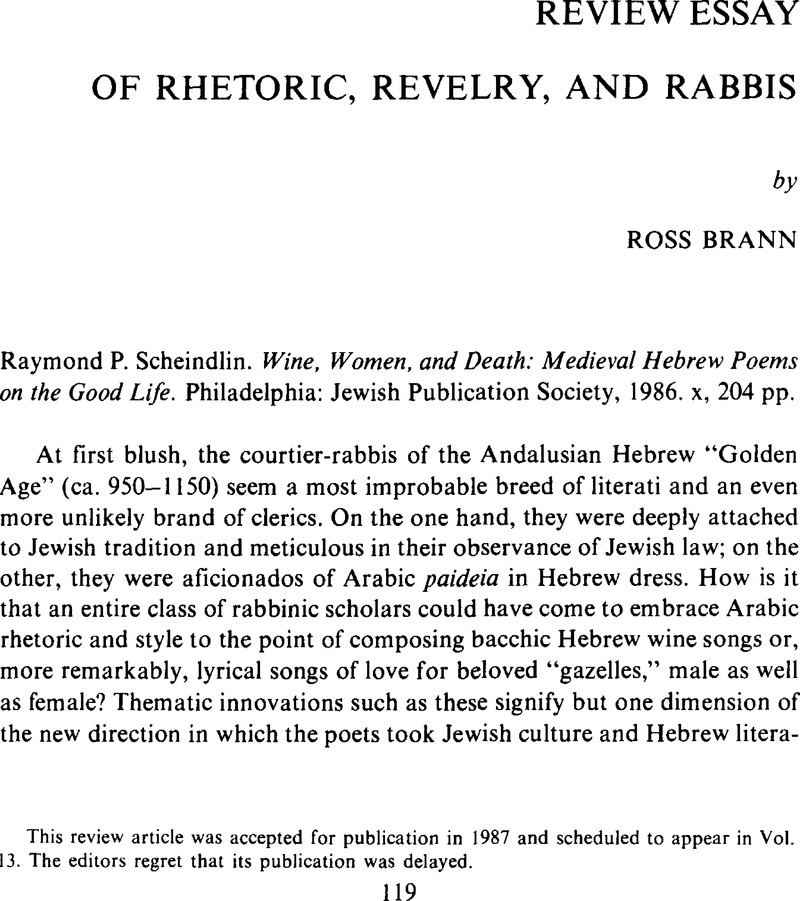Published online by Cambridge University Press: 15 October 2009

This review article was accepted for publication in 1987 and scheduled to appear in Vol. 13. The editors regret that its publication was delayed.
1. Jaeger, Werner, Paideia: The Ideals of Greek Culture (Oxford, 1944), 2:144,Google Scholar cited byLanham, R. A.The Motives of Eloquence: Literary Rhetoric in the Renaissance (New Haven, 1976), p. 3 n. 1.Google Scholar
2. The rhetoric found in liturgical and devotional poetry is, in theory, purposeful rather than playful. It is rhetoric in service of a higher ideal rather than rhetoric for its own sake.
3. Diwan shemu′el ha-nagid; Ben Tehillim, ed. Yarden, D. (Jerusalem, 1966), pp. 274–278. The anecdote is related in the superscriptions to poems 114–128Google Scholar
4. A similar argument can be made to explain the poets′ fondness for tajnis (paranomasia) mannerisms (cf. Moses ibn Ezra's Sefer ha′anaq), epigrams (cf. the Nagid's Ben mishlei), and other such “exquisite trifles.”
5. The transmission of secular Hebrew poetry in the Middle Ages is studied bySchirmann, Hayyim, “Secular Hebrew Poetry in the Geniza Manuscripts” [Heb.], in Te′uda I: Cairo Geniza Studies, ed. Friedman, M. (Tel Aviv, 1980), pp. 97–123.Google Scholar See alsoYahalom, Joseph and Benabu, Isac, “Towards a History of the Transmission of Secular Hebrew Poetry from Spain”[Heb.], Tarbiz 54 (1985): 245–262.Google Scholar
6. New critical editions of the diwans (that is, the secular poetry) of Judah ha-Levi and Abraham ibn Ezra are major desiderata
7. SeeYellin, , Introduction to the Hebrew Poetry of the Spanish Period [Heb.] (Jerusalem, 1932).Google Scholar
8. SeePagis, , Secular Poetry and Poetic Theory: Moses ibn Ezra and His Contemporaries [Heb.] (Jerusalem, 1970).Google Scholar
9. Change and Tradition in the Secular Poetry: Spain and Italy [Heb.] (Jerusalem, 1976).
10. Proceedings of the World Congress of Jewish Studies 1 (1947): 396–403.
11. Two interesting applications of this perspective areYahalom, Joseph, “Poetry and Society in Egypt: An Examination Based on the Attitude to Judah ha-Levi's Secular Poetry” [Heb.], Zion 45 (1980): 286–298,Google Scholar andScheindlin, Raymond P., “Fawns of the Palace and Fawns of the Field,” Prooftexts 6, no. 3 (1986): 189–203Google Scholar
12. For example,Allony, N., “The Reaction of Moses ibn Ezra to ′Arabiyya,” Bulletin of the Institute for Jewish Studies 1 (1973): 19–40; and idem, ed., Ya′aqov ben El′azar: Kitab al-kamil (Jerusalem, 1977), pp. 6–8.Google Scholar
13. Zumthor, Paul, Speaking of the Middle Ages, trans. White, S., foreword by E. Vance (Lincoln, 1986), p. 33.Google Scholar
14. Medievaliaet Humanistica.ns. 7 (Medieval Poetics), ed. P. Clogan (1976): 101–115.
15. Edited byHalkin, A. S. under the title Sefer ha′Iyyunim weha-diyyunim (Jerusalem, 1975).Google Scholar
16. Muslim Studies, ed. Stern, S. M. and translated by Barber, C. R. and S. M. Stern (Albany, 1967), vol. 1, pp. 35–36.Google Scholar
17. Schirmann, Jefim, “The Ephebe in Medieval Hebrew Poetry,” Sefarad 15 (1955): 55–68;Google ScholarAllony, Nehemiah, “Ha-şevi we-ha-gamal be-shirat sefarad,” Oşar yehudei sefarad 4 (1961): 16–43; and idem, “The Zevi [Nasib] in the Hebrew Poetry in Spain,” Sefarad 23 (1963): 311–321.Google Scholar
18. See, for example,Weinberger, Leon J., Jewish Prince in Moslem Spain: Selected Poems of Samuel ibn Nagrela (Tuscaloosa, Ala., 1973),Google Scholar andGoldstein, David, The Jewish Poets of Spain, revised and expanded edition (New York, 1971).Google Scholar
19. New York, 1981.